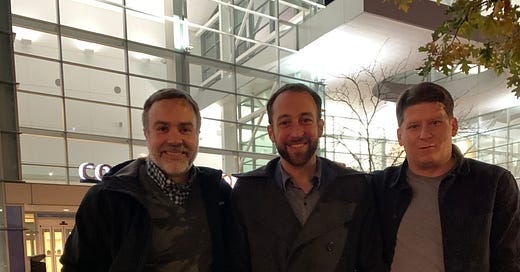Gratitude: A Thanksgiving Entry in Four Points
Who Can Live Without Being Grateful? And There Is So Much to Be Grateful For
This past week, I was at the annual American Academy of Religion meeting in Denver, catching up with friends, seeing the thousands of new books that come out every year, and attending a couple of sessions. One of the sessions I went to was me presenting the paper that began in this space as the meditation on Augustine, Howard Thurman, and the love of our enemies. But really, the papers aren’t the point.
I had lofty aspirations of doing some posts this week, but on the heels of returning back home on Monday, and then, turning around to visit my family for the remainder of the week, hard, thinking it’s going to have to wait until after Thanksgiving nap.
And so, instead of a continued look into the keywords of the moral life, four things that this moral theologian is grateful for, in no particular order.
Friendship
This past week, I have a very good fortune of being able to visit at length with some people who I’ve known for decades now, and only ever get to really see in this one place each year. It’s kind of become a habit of getting together for breakfast with Keith, of having coffee with a couple of other people that I’ll corresponds with online during the year, and then dinner one night is always with Dennis, my former seminary professor.
The academic life, and the life of mind more broadly, can be a very lonely one. Even when you have colleagues as great as mine next-door, there always is a sense that the things that you find yourself caring and thinking about, or not entirely a shared project, but, those ideas what you find others in the wide world to share with. And it is a blessing to that when that happens.
Over time, those shared ideas and projects become something of a shared commitment to the other person, and not just the ideas. So, I look forward to getting together with people who do dogmatic theology, Hebrew poetry, orthodox culture and hagiography. These intellectual ideas are not my own, but I care about the people who care about them.
(Long distance correspondents met in the flesh for the first time over tacos)
Pretension and Its Death
One of the first things you notice at any academic conference, is the lack of agreement about what kind of pecking order there might be without this ones. Christian theology tends to get pretty self-conscious at the American Academy of religion, and that once upon a time, there were a few other subdisciplines represented. Now, the methodologies of what religion is, how religion is practiced, and what value religion has the modern world seems to be a very open question.
Accordingly, there are certain pockets, which I will not name, which get pretty pretentious about their own work and positioning. Perhaps it’s just individuals within those pockets, though, I do suspect that some pockets let themselves more readily to this vice.
On Saturday night, then, at the end of a long day, I sat across the table from a mentor and friend that I’ve been trying to catch up with. This is a person who has experienced not a small amount of academic prestige in the last two years, having written a very good book that has gotten a lot of good reception. And there was a sense of fatigue about it. My own fatigue with it comes from the last few years, having lost both tenure and an endowed chair at my former university due to institutional negligence. His was more painfully earned, feeling the disconnect between institutional commitments, and what the study of religion is supposed to be about.
The friendship, I feel in the spaces makes the pretension all that more hollow. What does it matter if I ever get tenure again? What does it matter if a book I write wins an award? The answer is rightly that it doesn’t matter at all. These are the trappings which institutions can give, but ultimately are shallow prices compared with friendship and companionship.
And still the pecking orders continue. Still, we receive, and give awards in the hopes of simply honoring excellence, while knowing that there is not a small amount of kingdom building occurring in the giving and receiving of awards. It’s a subtle hunger, a slow, annoying ache, and wanting to be recognized, and it is the grace of God when all of our ambition runs up against a brick wall.
Breakfast
At this conference, the capstone of every day is the reception circuit at night, during which of the different universities, departments, and academic publishing houses, put on parties that last long past my bedtime. Sometimes, these can be real revelries and reunions, in which people who haven’t seen each other, serendipitously run into one another over free wine.
I have a couple of strategic ones that I go to, mostly, because I feel indebted to the hosts. But for me, it’s the breakfasts. It’s the early morning with the crisp air, having freshly showered and ready to eagerly approach the day, and doing it over an hour and a half of coffee and breakfast foods. I’ll skip on lunches, mostly because they are short times crammed in between meetings and conference papers, but breakfasts are times to stretch out.
This year during breakfast, I got to catch up with several people in particular, who I’ve only ever corresponded with, but not actually ever spent any time with in person. Though our friendships, I feel, have preceded the moment, it was over breakfast food that the idea of a friendship opened up, and there’s something more like a concrete commitment. Breakfast is a good time for this to happen, I think, in that at breakfast, we are all beginning the day, and all in need, and breakfast is generally a less genteel meal than dinner. The pretension is less, the friendship is more deeply appreciated, and all of it facilitated by multiple cups of coffee.
Bonhoeffer argues in one place that the beginning, and ending of my day is with the evening, with a setting sun, but I kind of disagree with him on this: it’s hard to argue with the fumbling, and half asleep conversation that happens over breakfast, and that it is less guarded and more approaching authenticity, then other times I think.
(My children’s response at me boarding the first plane home)
Departures
Nothing could, and maybe nothing should, last indefinitely. This is true of everything within life, no matter how desperately I might wish for something to last in perpetuity, such as marriage, a vocation, or health. Having approached middle-age, I know that there is a time limit on all good things, and so, appreciating them comes with a bitter, sweet acknowledgment that I will not be able to appreciate them in definitely, at least not as a participant.
After about two full days of the annual conference, I’m ready to be done. Much more than this, and I find myself led into going to sessions for the sake of going to sessions, or wandering book stalls, as a matter of waste, instead of actively looking to see what has been published. It becomes a cycle, a circling the landing strip, the killing of time.
The departure then, becomes not only a eminent remind her, that I need to make good use of the time and hands, to see friends, that I may not see for another year, and to lean into the fatigue that inevitably comes after a longer night out. it also comes as a welcome guest, to leave the unreal space of the conference, and return to the ordinary cycles of parenting, responsibilities, and obligations. Conferences are good, and that they help sharpen thinking, and reconnect us with colleagues and far-flung places.
But for them to be meaningful, they have to end. They exist not for themselves, but for the return. They are not the end toward which we work, but that which helps sustain work. And so, each year, as I fall asleep on the first flight home, I am grateful to have gone, and can’t wait to get back to ordinary stuff, haven’t been reminded that there are thousands of others out their hacking away in small ways, at this one shared work.
Want to support this newsletter? Try a month for free!





